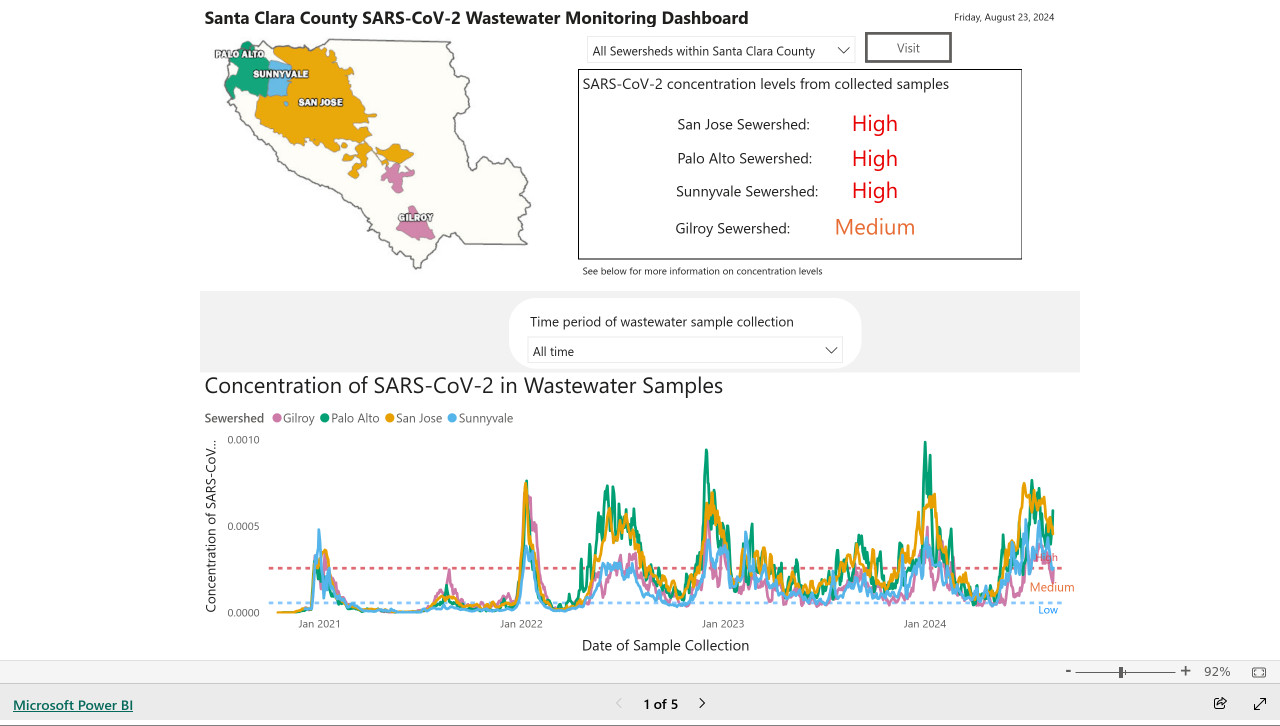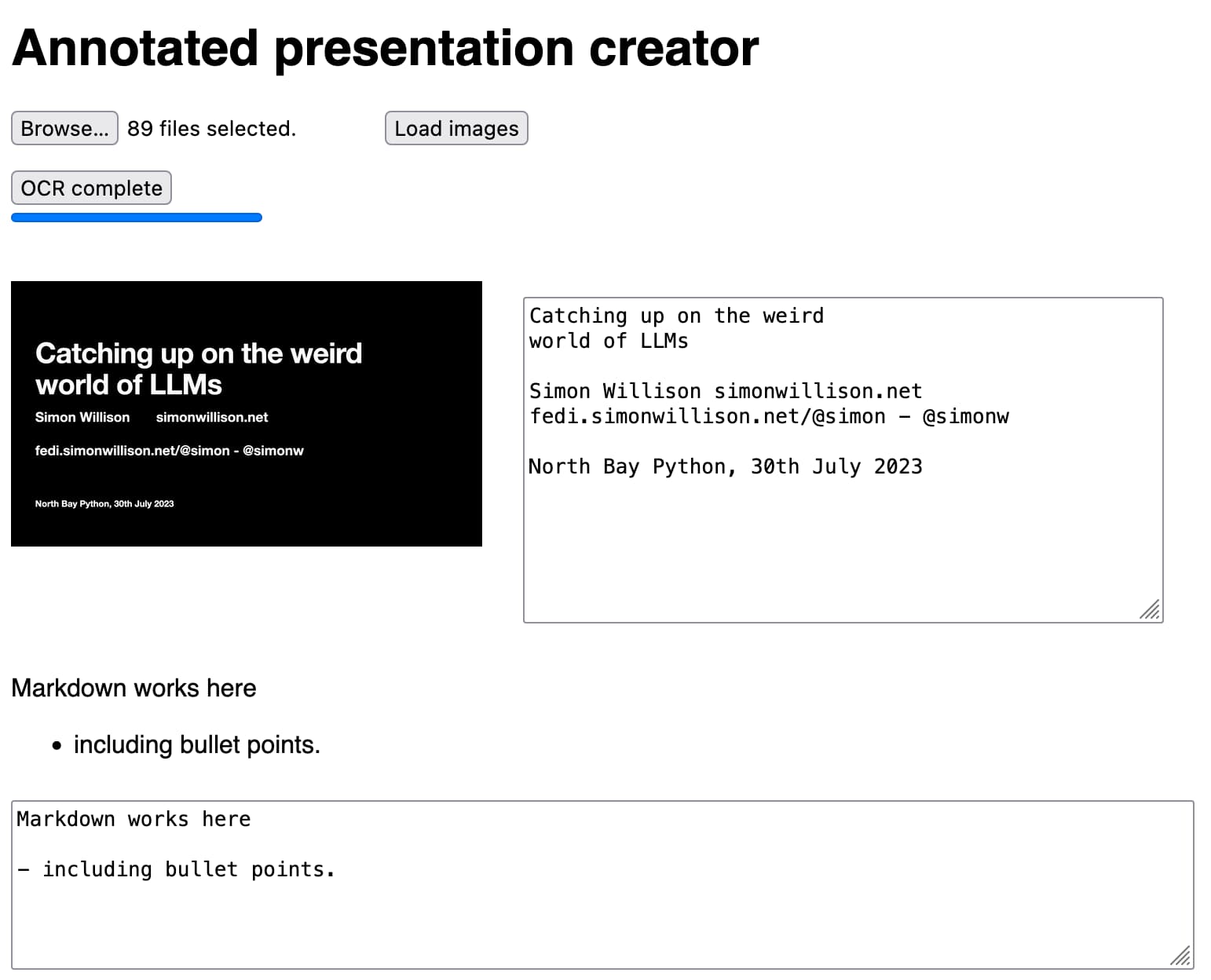14 posts tagged “alt-text”
2025
New dashboard: alt text for all my images. I got curious today about how I'd been using alt text for images on my blog, and realized that since I have Django SQL Dashboard running on this site and PostgreSQL is capable of parsing HTML with regular expressions I could probably find out using a SQL query.
I pasted my PostgreSQL schema into Claude and gave it a pretty long prompt:
Give this PostgreSQL schema I want a query that returns all of my images and their alt text. Images are sometimes stored as HTML image tags and other times stored in markdown.
blog_quotation.quotation,blog_note.bodyboth contain markdown.blog_blogmark.commentaryhas markdown ifuse_markdownis true or HTML otherwise.blog_entry.bodyis always HTMLWrite me a SQL query to extract all of my images and their alt tags using regular expressions. In HTML documents it should look for either
<img .* src="..." .* alt="..."or<img alt="..." .* src="..."(images may be self-closing XHTML style in some places). In Markdown they will always beI want the resulting table to have three columns: URL, alt_text, src - the URL column needs to be constructed as e.g.
/2025/Feb/2/slugfor a record where created is on 2nd feb 2025 and theslugcolumn containsslugUse CTEs and unions where appropriate
It almost got it right on the first go, and with a couple of follow-up prompts I had the query I wanted. I also added the option to search my alt text / image URLs, which has already helped me hunt down and fix a few old images on expired domain names. Here's a copy of the finished 100 line SQL query.
Notes from my Accessibility and Gen AI podcast appearance
I was a guest on the most recent episode of the Accessibility + Gen AI Podcast, hosted by Eamon McErlean and Joe Devon. We had a really fun, wide-ranging conversation about a host of different topics. I’ve extracted a few choice quotes from the transcript.
[... 947 words]2024
My @covidsewage bot now includes useful alt text. I've been running a @covidsewage Mastodon bot for a while now, posting daily screenshots (taken with shot-scraper) of the Santa Clara County COVID in wastewater dashboard.
Prior to today the screenshot was accompanied by the decidedly unhelpful alt text "Screenshot of the latest Covid charts".
I finally fixed that today, closing issue #2 more than two years after I first opened it.
The screenshot is of a Microsoft Power BI dashboard. I hoped I could scrape the key information out of it using JavaScript, but the weirdness of their DOM proved insurmountable.
Instead, I'm using GPT-4o - specifically, this Python code (run using a python -c block in the GitHub Actions YAML file):
import base64, openai client = openai.OpenAI() with open('/tmp/covid.png', 'rb') as image_file: encoded_image = base64.b64encode(image_file.read()).decode('utf-8') messages = [ {'role': 'system', 'content': 'Return the concentration levels in the sewersheds - single paragraph, no markdown'}, {'role': 'user', 'content': [ {'type': 'image_url', 'image_url': { 'url': 'data:image/png;base64,' + encoded_image }} ]} ] completion = client.chat.completions.create(model='gpt-4o', messages=messages) print(completion.choices[0].message.content)
I'm base64 encoding the screenshot and sending it with this system prompt:
Return the concentration levels in the sewersheds - single paragraph, no markdown
Given this input image:

Here's the text that comes back:
The concentration levels of SARS-CoV-2 in the sewersheds from collected samples are as follows: San Jose Sewershed has a high concentration, Palo Alto Sewershed has a high concentration, Sunnyvale Sewershed has a high concentration, and Gilroy Sewershed has a medium concentration.
The full implementation can be found in the GitHub Actions workflow, which runs on a schedule at 7am Pacific time every day.
Experimenting with local alt text generation in Firefox Nightly (via) The PDF editor in Firefox (confession: I did not know Firefox ships with a PDF editor) is getting an experimental feature that can help suggest alt text for images for the human editor to then adapt and improve on.
This is a great application of AI, made all the more interesting here because Firefox will run a local model on-device for this, using a custom trained model they describe as "our 182M parameters model using a Distilled version of GPT-2 alongside a Vision Transformer (ViT) image encoder".
The model uses WebAssembly with ONNX running in Transfomers.js, and will be downloaded the first time the feature is put to use.
2023
Ice Cubes GPT-4 prompts. The Ice Cubes open source Mastodon app recently grew a very good "describe this image" feature to help people add alt text to their images. I had a dig around in their repo and it turns out they're using GPT-4 Vision for this (and regular GPT-4 for other features), passing the image with this prompt:
What’s in this image? Be brief, it's for image alt description on a social network. Don't write in the first person.
How I make annotated presentations
Giving a talk is a lot of work. I go by a rule of thumb I learned from Damian Conway: a minimum of ten hours of preparation for every one hour spent on stage.
[... 2,128 words]2017
Skip the title text! Nobody uses them – they don’t work on touch screens and on desktop they require that the user hovers for a while over an image, which nobody does. Also, adding a title-text makes some screen readers both read the title-text and the alt-text, which becomes redundant.
Alt-texts: The Ultimate Guide. By Daniel Göransson, a web developer with vision impairment who uses a screen reader. This is the best, most practical guide to writing image alt text I’ve seen. Just one of the neat tips contained within: consider ending your alt text in a period, so the screen user knows to pause.
2008
The alt=“” attribute from Ian Hickson. In case you were wondering how it all ended, Hixie has a mammoth summary post explaining the facts and the potential alternatives.
This Week in HTML 5—Episode 1.
It looks like the most controversial aspect of the HTML 5 spec has been addressed - now, instead of omitting the alt attribute for user generated content that has no relevant information available, sites are advised to provide an indication of the kind of image expected surrounded by braces, for example alt="{uploaded photo}".
2007
Why the Alt Attribute May Be Omitted. “The benefit of requiring the alt attribute to be omitted, rather than simply requiring the empty value, is that it makes a clear distinction between an image that has no alternate text (such as an iconic or graphical representation of the surrounding text) and an image that is a critical part of the content, but for which not alt text is available.”
2003
GAWDS now inviting new members
The Guild of Accessible Web Designers is a world wide organisation of web designers and developers committed to helping each other, and promoting the message that accessible web design is ’good for business’
. I’d describe the organisation in detail here, but the official site does a far better job than I could. If you’ve been following the web accessibility community in any detail You’re likely to recognise a number of the names on the registered members list; I’ve been following GAWDS developments for a while and its shaping up to be a great resource for accessibility minded designers. I’ve also contributed an article on Writing good ALT text which hopefully provides some useful advice on a frequently misunderstood topic.
2002
Image map accessibility
Mark Pilgrim continues to educate with day 24 of his series. Client side image maps need not pose a barrier to accessibility thanks to the helpful way in which alternative browsers use the alt attribute. They still aren’t much use for people using a normal (non-lynx) browser with images turned off though, and server side image maps are a big no.
Alt all the way
Mark says that today is the most important day of his whole accessibility series, and who are we to argue? The topic is the alt attribute for images, and the message is simple: Every image should have one, even if the image is there purely as layout decoration (in which case an empty attribute should be used). Surprisingly Mark does not give advice on chosing text for the attribute but he does provide an excellent further reading list, which includes Hixie’s superb Mini FAQ About The Alternate Text Of Images.

